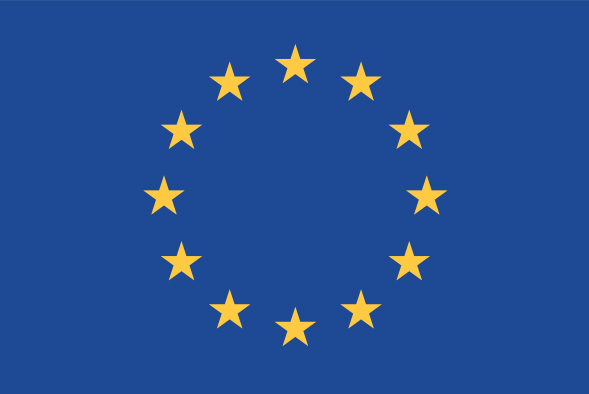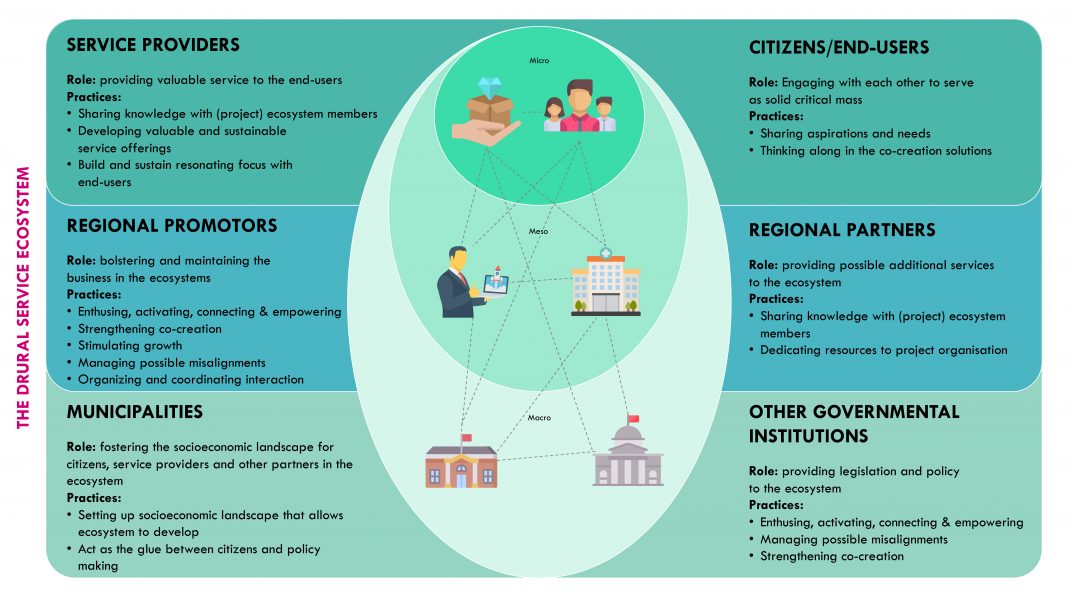Michel Ehrenhard, Yasin Sahhar, Tina Hormann & Myriam Martin, place the spotlight on inclusive digital rural transformation, in particular, co-developing a digital service marketplace for regional ecosystems
dRURAL PROJECT
The dRural project aims to foster economic growth and quality of life by creating a digital service marketplace for rural regions. Service offerings are provided on a local portal built on a shared underlying digital platform. These services range from booking healthcare appointments to shared mobility or smart farming solutions. The complexity of the services depends on the number of integrated additional systems into the platform.
The European regions initially involved in the project are Extremadura in Spain, Dubrovnik- Neretva in Croatia, and Gelderland-midden in the Netherlands. The project’s scaling strategy involves including additional regions and services facilitated by cascade funding. For more information, visit www.drural.eu or follow us on our social media accounts.
One in five Europeans live in rural areas, yet rural GDP growth is falling behind. (1) Consequently, regional inequality threatens economic well-being and social and political cohesion. Digitalisation holds great promise in overcoming regional inequality by potentially increasing economic and social opportunities through increased connectivity and service offerings.
Yet, there is a wealth of academic literature on the gap between the promise of digitalisation and its successful implementation and uptake. (2) To close this gap, the main aim of the dRural project is to co-develop a digital service marketplace – in close alignment with existing regional ecosystems – on a shared underlying technological platform.
Ecosystem alignment: Digitalisation of services
Despite the many benefits rural areas bring their inhabitants, accessibility of all kinds of services may be complicated, for instance, due to distance and scalability. Digitalisation of services is seen as one way to overcome such complications. However, the essence of services is that they are co-created by suppliers and end-users to obtain value in use. (3)
Not only do digital services demand substantial technological knowledge, but at least as crucial is an in-depth understanding of the various worldviews of involved stakeholders in the regional ecosystem. Creating shared worldviews is vital to overcome this potential complication.
Technology can be developed closer to such worldviews by directly engaging with relevant stakeholders through workshops and on-site observations. Better alignment with relevant worldviews is bound to lead to better technology uptake. Yet, how do you bridge the gap between idiosyncratic worldviews on one side and general technological capabilities on the other?
Goal-setting for impactful digital service offerings
Early in the project, we took a multi-level approach to facilitate goal setting concerning the involved regions’ economic, environmental, and social goals. We started by deriving relevant goals from existing regional policies. We used these to help frame regional stakeholders’ ideas about which digital services would lead to tangible impact.
Then, over several cycles, regions were facilitated in finetuning their goals and related key performance indicators. Thus clarifying what would constitute concrete, impactful digital service offerings for relevant stakeholders contributing to more than solely economic gains.
Scaling impact in digital rural transformation Cross-sector partnerships and multiple regions’ engagement in the project facilitated learning across sectoral and regional boundaries, significantly improving service development and idea exchange. (4)
Moreover, through cascade funding, complimentary ecosystem actors were drawn to offer their services via the digital marketplace, further contributing to regional value co-creation via the platform.
Additionally, an open call for mirror regions facilitated the involvement of additional regions in the marketplace, thus scaling both services and regions by validating, replicating, and improving on earlier learnings.
Digital rural transformation: Sustainability of impact
Obviously, impact only exists if the services continue to be offered after the project concludes. One key aspect is the transfer of developed knowledge, facilitated via short training videos and interactive workshops in an academy. These materials provide short, simple, and concrete training catered to various stakeholders to ensure the continued development and deployment of services, optimal user experiences, and general (strategic) understanding of the marketplace.
Additionally, particular attention is devoted to defining the platform business model of the regional marketplace to ensure sustainability after the project has ended. Here, bottom-up hybrid governance is needed to find synergy and work towards a collective agreement for collaboration. (5)
Inclusive digital rural transformation: Lessons learned
Looking back, the intense focus on this technology development project’s impact helped put the regions’ centre stage. Consequently, the developed digital services closely align with the needs of the involved regional stakeholders. Nonetheless, it is essential to recognise that technology enables but also constrains.
The scale and complexity of the project have, in practice, extended the timeline for technological developments beyond initial expectations. For this reason, the value of open standards cannot be overemphasised, next to the involvement of experts with an in-depth understanding of both technology and rural communities.
We conclude by highlighting that the importance of digitalisation in rural strategies is key, and much-needed investments need to be prioritised to sustain, let alone increase, rural regional impact.
CLICK HERE for references


This work is licensed under Creative Commons Attribution-NonCommercial-NoDerivatives 4.0 International.


